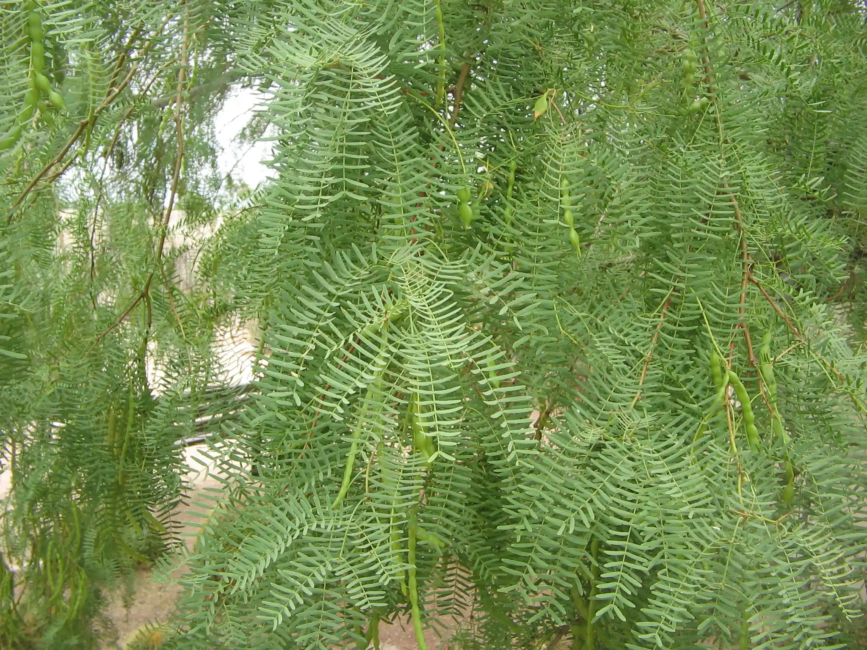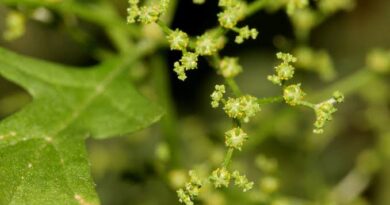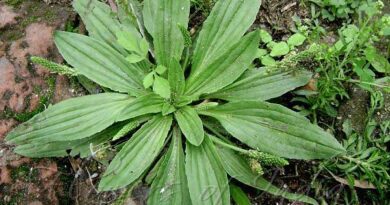18 Medicinal Health Benefits Of Prosopis (Mesquite)
Prosopis, commonly known as Mesquite, is a genus of flowering plants belonging to the legume family, Fabaceae. This diverse and hardy group of plants is renowned for its adaptability and resilience in various ecosystems around the world.
With over 40 recognized species, Prosopis has earned a reputation for its versatility, economic significance, and ecological importance.
Prosopis belongs to the Fabaceae family, also known as the legume or bean family. This family is one of the largest among angiosperms, and Prosopis is part of the subfamily Mimosoideae.
Within this subfamily, Prosopis is classified into a tribe called Mimoseae. The genus contains both shrubs and small trees, and it is recognized by its unique, pinnately compound leaves and distinctive seed pods.
Mesquite is native to arid and semi-arid regions of the Americas. It thrives in diverse environments, from deserts and grasslands to tropical and subtropical regions.
The genus’s natural distribution extends from the southwestern United States through Mexico, Central America, and into South America. Some species, such as Prosopis juliflora, have been introduced and naturalized in other parts of the world, including Africa, Asia, and Australia.
Ecological Roles of Prosopis
Prosopis plays a significant role in various ecosystems due to its ability to withstand harsh environmental conditions and its symbiotic relationship with nitrogen-fixing bacteria.
Mesquite trees have deep root systems that can access groundwater, making them particularly well-suited for arid regions. They also provide shelter and food for a wide range of wildlife, including birds, mammals, and insects.
The Botanical Description of Prosopis
1. General Appearance: Prosopis species can vary in size and form, but they generally appear as small to medium-sized trees or shrubs. Their growth habits are shaped by their surroundings, with some adopting a tree-like structure and others remaining shrub-like. The plants are typically well-branched, featuring multiple stems.
2. Leaves: Mesquite leaves are pinnately compound, comprising multiple pairs of small leaflets along a central stem. The leaflets are typically small and oblong in shape. The color of the leaves can vary from light green to a bluish-gray hue, which helps reduce water loss through transpiration in arid environments.
3. Flowers: The flowers of Prosopis plants are small, typically pale yellow to greenish in color. They are grouped in clusters known as racemes, creating a visually appealing display. The flowers serve as a vital source of nectar for various pollinators, including bees.
4. Fruit: Prosopis produces distinctive seedpods, often referred to as “mesquite beans.” These pods are elongated and curved, with a leathery texture. The beans house the seeds and are a significant food source for both wildlife and humans.
5. Bark: The bark of Prosopis trees tends to be rough and deeply furrowed, offering protection from environmental stresses like intense sunlight and extreme temperatures.
6. Root System: Mesquite trees possess a deep and extensive root system that enables them to access water sources buried deep underground, making them well-suited for arid regions.
The Geographic Distribution of Prosopis
1. North and South America: Prosopis is native to the Americas, with a significant presence in both North and South America. In North America, mesquite trees are found in the southwestern United States and parts of Mexico. They are particularly abundant in the Sonoran and Chihuahuan Deserts. In South America, mesquites extend into regions like Argentina, Paraguay, and Chile.
2. Africa: Prosopis species have been introduced to various countries in Africa due to their hardiness and value as a food source. They are found in arid and semi-arid regions, including parts of Kenya, Sudan, and Ethiopia.
3. Asia: In Asia, Prosopis has also been introduced and cultivated. Countries like India, Pakistan, and Iran have adopted mesquite species for their adaptability to arid climates.
4. Australia: Mesquites have been introduced to Australia, primarily in regions with arid and semi-arid conditions. They are often referred to as “mesquite weed” due to their invasive nature in some areas.
The Chemical Composition of Prosopis
1. Tannins: Prosopis plants are known for their high tannin content. Tannins are a group of polyphenolic compounds that serve as natural defenses against herbivores and pests. They make the leaves and beans of mesquites unpalatable to many animals.
2. Proteins and Amino Acids: The seeds of Prosopis species are rich in proteins and amino acids, making them a valuable food source for both wildlife and humans. The protein content in mesquite beans is often higher than that of many legumes.
3. Carbohydrates: Mesquite beans also contain carbohydrates, including sugars and starch. These carbohydrates provide a source of energy for animals that consume them.
4. Fiber: The pods of Prosopis plants are a good source of dietary fiber. This dietary fiber can aid in digestion for animals and potentially has health benefits for humans when consumed as food.
5. Phytochemicals: Mesquites contain various phytochemicals, including flavonoids and alkaloids, which may have antioxidant and potential medicinal properties.
6. Lignin: The wood of Prosopis trees contains lignin, which contributes to the plant’s durability and suitability for various uses, including as firewood and for construction.
7. Water Storage Adaptations: The ability of mesquites to store water is attributed to their chemical composition, particularly in the root system, which allows them to access underground water sources efficiently.
Read Also: How long you can store your poultry feeds for your birds
The Medicinal Health Benefits Of Prosopis (Mesquite)

Prosopis, commonly known as mesquite, offers a wide array of medicinal health benefits, rooted in its rich chemical composition and historical use by indigenous cultures.
Here, we list and explain 18 of the remarkable health benefits associated with Prosopis:
1. Anti-Inflammatory Properties: Mesquite possesses anti-inflammatory compounds that can help reduce inflammation in various parts of the body.
2. Pain Relief: The analgesic properties of mesquite can provide relief from various types of pain, including headaches and muscle aches.
3. Immune System Support: Mesquite’s phytochemicals can boost the immune system, helping the body fight off infections and diseases.
4. Digestive Health: Mesquite is known to aid in digestion, relieving issues like indigestion and constipation.
5. Blood Sugar Regulation: Some studies suggest that mesquite may help regulate blood sugar levels, making it beneficial for individuals with diabetes.
6. Antioxidant Effects: Mesquite is rich in antioxidants, which combat free radicals, protecting cells from damage.
7. Respiratory Health: It can help alleviate respiratory issues, such as coughs and asthma, due to its expectorant properties.
8. Skin Health: Mesquite’s topical application can soothe skin irritations, including rashes and insect bites.
9. Weight Management: Mesquite’s fiber content can aid in weight management by promoting a feeling of fullness.
10. Cardiovascular Health: The plant may contribute to cardiovascular health by reducing cholesterol levels and blood pressure.
11. Anti-Diarrheal Effects: Mesquite has been used to alleviate diarrhea, thanks to its astringent properties.
12. Bone Health: Its calcium content can support bone health and prevent conditions like osteoporosis.
13. Liver Health: Some studies suggest that mesquite can support liver function and detoxification.
14. Mood Enhancement: Mesquite’s mild sedative properties can help reduce stress and anxiety.
15. Anti-Bacterial Effects: It exhibits antibacterial properties that can be beneficial for wound care and oral health.
16. Eye Health: Some indigenous cultures have used mesquite for eye-related issues, such as conjunctivitis and dry eyes.
17. Menstrual Pain Relief: Mesquite may help alleviate menstrual cramps and discomfort.
18. Anti-Cancer Properties: While more research is needed, some studies indicate that mesquite may have potential anti-cancer effects due to its antioxidant compounds.
The Methods of Usage to Achieve the Provided Health Benefits Of Prosopis (Mesquite)
Listed below are methods of using mesquite to harness its medicinal benefits and achieve optimal results:
1. Herbal Tea: Prepare mesquite herbal tea by steeping dried mesquite leaves or pods in hot water. This method is excellent for obtaining the plant’s anti-inflammatory and immune-boosting benefits.
2. Powdered Form: Mesquite can be ground into a fine powder and incorporated into smoothies, beverages, or baked goods. This is a convenient way to include it in your diet.
3. Topical Applications: Create a poultice or ointment using mesquite for skin issues or wounds. Apply it directly to the affected area for relief.
4. Capsules or Supplements: Mesquite supplements are available in capsule form. This is a convenient option for those looking to incorporate its benefits into their daily routine.
5. Tinctures: Mesquite tinctures can be consumed by diluting them in water. They provide a concentrated form of the plant’s medicinal properties.
6. Inhalation: Inhaling the steam from mesquite tea can be beneficial for respiratory issues. Boil the tea, lean over the pot, and inhale the steam.
7. Culinary Use: Mesquite flour can be used in cooking and baking. It adds a unique flavor and nutritional value to various dishes.
8. Compresses: Soak a cloth in mesquite tea and use it as a compress for skin conditions or muscle pain.
9. Aromatherapy: Mesquite essential oil can be used in aromatherapy to promote relaxation and reduce stress.
The Side Effects Of Using Prosopis Medicinal Plant
While Prosopis (mesquite) offers numerous health benefits, it’s essential to be aware of potential side effects and exercise caution when using it:
1. Allergic Reactions: Some individuals may be allergic to mesquite. It’s advisable to perform a patch test before topical application.
2. Digestive Issues: Excessive consumption of mesquite can lead to digestive discomfort, including diarrhea and abdominal pain.
3. Blood Sugar Regulation: If you have diabetes or are taking medications to regulate blood sugar, consult a healthcare professional before using mesquite, as it may interact with these medications.
4. Pregnancy and Nursing: Pregnant and nursing women should consult a healthcare provider before using mesquite, as its safety in these situations is not well-established.
5. Drug Interactions: Mesquite may interact with certain medications. Consult your healthcare provider if you’re taking prescription drugs.
6. Excessive Sedation: While mesquite can have sedative properties, excessive use may lead to drowsiness and reduced alertness.
7. Skin Sensitivity: Some individuals may experience skin sensitivity when applying mesquite topically. Discontinue use if irritation occurs.
Read Also: 20 Medicinal Health Benefits of Phytolacca (Pokeweed)
The Scientific Research and Studies of Prosopis (Mesquite)

Scientific research and studies of Prosopis, commonly known as mesquite, have provided valuable insights into the plant’s properties and potential benefits. Here, we list and explain the key findings from these studies:
1. Anti-Inflammatory Effects: Scientific studies have confirmed the anti-inflammatory properties of mesquite. Compounds found in mesquite have been shown to reduce inflammation in laboratory experiments, suggesting its potential in treating inflammatory conditions.
2. Antioxidant Activity: Mesquite’s rich antioxidant content has been the subject of research. Antioxidants help protect cells from oxidative damage and may play a role in preventing chronic diseases.
3. Blood Sugar Regulation: Some studies indicate that mesquite may help regulate blood sugar levels. This has sparked interest in its potential use for individuals with diabetes or those at risk.
4. Nutritional Value: Research has highlighted the nutritional value of mesquite beans, which are rich in protein, fiber, and essential nutrients. This makes mesquite a valuable food source, especially in arid regions.
5. Potential Anti-Cancer Properties: While more research is needed, preliminary studies suggest that mesquite’s antioxidants may have potential anti-cancer effects by reducing oxidative stress.
6. Immune-Boosting Compounds: Compounds in mesquite have been studied for their ability to enhance the immune system’s response, potentially helping the body defend against infections.
7. Digestive Benefits: Research has explored mesquite’s digestive benefits, including its use in traditional medicine for issues like indigestion and diarrhea.
8. Wound Healing: Some studies have examined the use of mesquite poultices for wound healing, highlighting its potential to promote skin health.
9. Phytochemical Analysis: Detailed phytochemical analyses have been conducted on mesquite to identify the specific compounds responsible for its health benefits.
10. Traditional Uses: Ethnobotanical studies have documented the traditional uses of mesquite by indigenous cultures, shedding light on its historical significance and applications.
11. Environmental Impact: Research has also addressed mesquite’s ecological impact, especially in regions where it is considered invasive. Understanding its interactions with the environment is crucial for sustainable land management.
The Safety Precautions and Recommendations In Using Prosopis (Mesquite) Medicinal Plant
While mesquite offers numerous health benefits, it’s important to follow safety precautions and recommendations when using it:
1. Allergies: Be aware of potential allergies to mesquite. Perform a patch test before topical application to check for skin sensitivities.
2. Dosage: Follow recommended dosage guidelines, whether using mesquite in tea, as a supplement, or in any other form. Overconsumption can lead to digestive discomfort.
3. Consult a Healthcare Provider: If you have underlying health conditions or are taking medications, consult a healthcare provider before using mesquite, as it may interact with certain medications.
4. Pregnancy and Nursing: Pregnant and nursing women should seek professional guidance before using mesquite due to limited safety data in these situations.
5. Hydration: Ensure adequate hydration, as mesquite can have diuretic effects. Drink sufficient water to stay properly hydrated.
6. Drug Interactions: If you are taking prescription medications, consult a healthcare provider to check for potential interactions with mesquite.
7. Quality and Source: When purchasing mesquite supplements or products, ensure they are from a reputable source and of high quality to guarantee safety and efficacy.
8. Skin Sensitivity: Monitor for skin sensitivity when applying mesquite topically. Discontinue use if irritation or allergic reactions occur.
FAQs About Prosopis (Mesquite) Medicinal Plant
Here are some frequently asked questions about mesquite, along with detailed answers:
1. Can I use mesquite as a natural remedy for inflammation?
Yes, mesquite has anti-inflammatory properties and can be used to alleviate inflammation in various parts of the body. It can be consumed as herbal tea or in other forms to benefit from its anti-inflammatory effects.
2. Is mesquite safe for children to use?
Mesquite is generally considered safe for children when used in moderation. However, it’s advisable to consult with a healthcare provider before giving it to children, especially in medicinal forms.
3. Can mesquite be used during pregnancy?
Pregnant women should exercise caution and consult with a healthcare provider before using mesquite, as its safety during pregnancy is not well-established.
4. How should mesquite be stored to maintain its quality?
Store mesquite products in a cool, dry place away from direct sunlight. Proper storage ensures the preservation of its quality and beneficial properties.
5. Are there any known interactions between mesquite and medications?
Mesquite may interact with certain medications, particularly those related to blood sugar regulation. It’s advisable to consult with a healthcare provider if you are taking prescription drugs.
6. Can mesquite be used for skin conditions?
Yes, mesquite can be used topically for skin conditions. It has soothing properties and can be applied as a poultice or in the form of creams or ointments.
7. Is it safe to use mesquite for long-term health benefits?
When used in moderation and as part of a balanced diet, mesquite can be safely incorporated into your routine for long-term health benefits.
Read Also: 7 Environmental Effects of Waste Disposal









